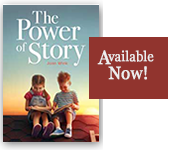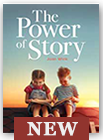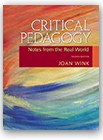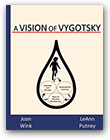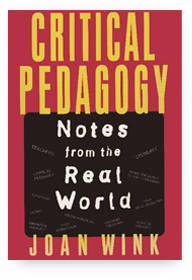pp. 225-228
by Joan Wink
Published by Libraries Unlimited/ABCLIO
Copyright © 2018 by Joan Wink
Epilogue: There Will Be Consequences
“Maybe you will want to add an epilogue,” my editor gently suggested to me after she read my manuscript.
“Let me muse,” I replied to her, while all the time I was thinking, “Oh, no, more?”
“Have you read Aunt Chip and the Great Triple Creek Dam Affair,” by Patricia Polacco?” she added.
I adore Patricia Polacco’s writing and quickly ordered the book. It came. I read it and enjoyed it, but I just didn’t see how I could use the content to write an epilogue. I went about with my busy life and waited, knowing that, sooner or later, an idea would pop into my head. I waited some more. My editor waited.
Finally, in desperation for an epilogue, I asked my friend Missy if I could go to her one-room isolated country school again and read the story to the students. Maybe then, something would happen, and I would find a story. Before going to the school, I grabbed several gifts for the kids—among them were various editions of Moby Dick by Herman Melville.
The kids and I loved the story of Aunt Chip; they were totally engaged, leaning forward in their chairs, as I read. They laughed; they sighed; they frowned; they pointed at items in the wonderful watercolor pictures of the Polacco book, and they finished my sentences as I read aloud.
“Moby Dick,” they said in unison several times, as I read. We loved the art in the book. One young very bright fifth-grade boy, Davey, who is normally quite engaged, seemed a bit distant emotionally, until the moment when I read, “There will be consequences,” and his head whipped around to see the book better. His jaw literally dropped. He was hooked. We were hooked.
In the story, the townspeople watched TV constantly—except for Eli’s Aunt Charlotte, who took to her bed 50 years ago to protest too much TV watching by the townspeople. Further more, she had no intention of ever getting out of bed again, now that there were no books in the town. In spite of her strange behavior, Eli loved to visit her and had his own special name for her, Aunt Chip. Eli loved to sit beside her bed and hear her stories, but he could not understand where she got them. How does Aunt Chip get those stories in her head?
“Books,” she explained to him.
“Books? How does a story come from a book?” he asked Aunt Chip. He and all the other townspeople did not read anymore. In fact, they no longer could read. Upon hearing this, Aunt Chip jumped out of bed, and headed into town with Eli, as she was so horrified to learn that people no longer read.
“There will be consequences,” she muttered.
When Aunt Chip and Eli got to town, he showed her that, indeed, there still were books all over town, but, instead of reading the books, the townspeople now used the books to hold up things (like a sagging house), to fill things in (like a pothole), to shore things up (like a dam), etc.
“There will be consequences,” Aunt Charlotte reminded us again. If people do not read, if libraries are closed, if books are used as doorstops, there will be consequences. In class as I was reading, I thought Davey was going to stare the words right out of the pages of the book.
“Moby Dick?” Bailey, an eighth-grade boy asked. He could see that I had brought several different copies of Moby Dick for the students. What was the connection? Why did I bring Moby Dickto read Aunt Chip and the Great Triple Creek Dam Affair? Bailey had no idea that hooking him into reading Moby Dick, or maybe The Old Man and the Sea, by Ernest Hemmingway, was my hidden objective. Too often, when I read to this group of students, it is a book that captures the younger students more than those who are almost ready to go to high school. Next year, Bailey must move from the family ranch to stay in town so that he can attend high school. Fortunately, in this case, Bailey has grandparents who live there. My wish is that Bailey finds his “home-run” reading book before he leaves for high school.
Back to the story of Aunt Chip: The watercolor pictures on this page of the book showed the whole town was being held up physically with books. Even the TV tower. Aunt Chip became so dismayed that she asked Eli to come home with her for a cup of tea where he began to grill her with his questions about books, stories, and reading. He even learned that once upon a time there had even been such a thing as a library, where books were kept, and people could take them and read them. However, with the advent of TV in the town, people stopped reading—everyone except the librarian, who eventually had to be carried away, as the townspeople thought she was mad. Closing a library? There will be consequences.
At this point in the story, Eli is totally mystified by the magic of reading.
“How do you read?” he asked Aunt Chip.
“Meaning, that is the key,” she told him.
“Can you teach me?” he asked his Aunt Chip.
However, do you remember, dear readers, that even the dam was held up with stacks of old books? Have you guessed which book Eli wanted to read? Yes, Moby Dick, and it was jammed smack dab in the middle of the book wall holding up the dam. When he climbed up the dam and grabbed it, you guessed it—the water from the dam began to leak into the town, and soon all of books in the wall of the dam broke loose. Actually, it exploded, and books starting raining down on the townspeople. The force of the water and books even wiped out the hallowed TV tower. Books were everywhere all over the town.
Did Eli, his friends, and the townspeople learn to read? Yes, because they had access to books.
As you know by now, that children who do not have access to books, do not read, and those books are found in our local libraries. Literacy lives in libraries where there are books and people who will tell you stories.
And, what happened to Bailey, the eighth-grade boy? When I last saw him, he was holding a classic heavy hardbound copy of Moby Dick, which the local library had shared with me. It was a gorgeous copy with gold on the edges of the pages, and beautiful old watercolor pictures. I also had a paperback modern copy, and a copy for readers who have dyslexia. Bailey and the other kids in the class and I compared the fonts and the appearances of the pages of the texts. The students gathered and talked about which pages were easier for them to read. To my surprise, they liked the classic, older hardcopy. A couple of students said that they liked the pages that had a font prepared for dyslexic readers. I thought the font in the softbound modern copy was the most appealing for my eyes.
I was supposed to return the heavy old classic copy Moby Dickto the public library, but that was the one that caught Bailey’s eye, and I was not about to take it away from him. I left that library copy with Bailey and immediately called the librarian and told her that I just could not return it yet, as Bailey was reading it.
Call me Ishmael. Look it up.
